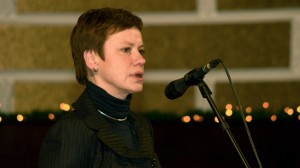RIGA — The former editor-in-chief of the Diena newspaper, Sarmīte Ēlerte, has expressed her preparedness to run for political office.
“I can say with confidence that I will run for election. I will put together a team and invite spirited and competent people,” Ēlerte told the Defli portal on Saturday.
The announcement comes after months of speculation whether the well-respected journalist would throw her hat in a political ring that, so far, lacks new faces. At stake is the national election in Latvia, which, judging by current polls, could result in Latvia having its first left-wing government since independence in 1991 if Harmony Center, the party of Riga’s Mayor Nils Ušakovs, wins.
Ēlerte headed Diena, arguably Latvia’s most influential newspaper, since 1992, and was described by the late New York Times columnist William Safire “as the most fascinating woman in the former Soviet Union.”
While the paper was her ward, Diena was a bastion of aggressive, old school journalism that never tired at taking on a corrupt political system. Before her departure in 2008, Ēlerte spearheaded numerous investigations into and criticisms of the so-called oligarchic clique of Ainārs Šlesers, Aivars Lembergs, and Andris Šķēle.
The paper was instrumental in defending Alekseijs Loskutovs, at the time the embattled head of the anti-corruption bureau, and organizing the so-called “umbrella revolution” that ultimately led to the downfall of then Prime Minister Aigars Kalvitis.
Details of Ēlerte’s participation in the October election are unclear, but it would appear that she will be included in, if not head, the Unity list of candidates, which itself is still in its embryonic stage. Ēlerte was a guest speaker at Saturday’s meeting of the Civil Union Party (Pilsoniskā Savienība). In her speech, she said that there might be dozens of reasons why Latvian parties are openly hostile to one another, but for the sake of one reason – Latvia’s secure future – they must learn how to cooperate.
The national Civil Union, which was founded by Ģirts Valdis Kristovskis and Sandra Kalniete, agreed on Saturday to join the new Unity coalition. Unity was announced last August as a coalition of Civil Union, New Era, and a Society for Different Politics, and it appears that its founding congress will be held in March.
New Era is expected to approve its participating in the coalition at its Feb. 18. Unity officials continue to say that the door is open to other parties, but so far no one has emerged. The People’s Party will fight as an independent party, as will the nationalist For Fatherland and Freedom/LNNK alliance. Regardless, Ēlerte’s name at the top of Unity’s list would be an enormous magnet for voters, who are thoroughly disillusioned with existing parties. An Ēlerte-led Unity would be a top contender along with the center-right Latvia’s First/Latvia’s Way union, and the center-left Harmony Union — both of which have expressed their desire to cooperate in the next election and form the next government.
Now that Ēlerte has declared her intention, the biggest intrigue surrounding the election will be whom former President Vaira Vīķe-Freiberga, who remains quite influential in Latvian society, will support.














She’s a welcome candidate, but not sure her appeal extends far beyond the chattering political classes. Better than Kristovskis at any rate.
She is very welcome, but please do not hang with Latvia´s First/Latvia´s Way union. That is Sleser´s yes-yes group :)
Maybe co-operating with Loskutovs, Sudraba…that could be a start for change, and kicking off old traditions of corruption and “money to own pockets via dummy companies” -policy.
I wonder what William Safire would have said if he knew that Sarmite Elerte joined the Communist Party in the late 1980’s, at a time when reform was already in the air, when there was no real need to join the Communist Party – other than opportunism.
Politics has always been Elerte’s forte – it is good that she has finally declared her real colours. And she was never a real journalist while at “DIena”, as she never wrote anything, as opposed to her deputy editor at the time Pauls Raudseps.
So much cynicism! If you read what she says, there is no doubt she would be good for Latvia with her breadth of knowledge, realism, and view to the future.